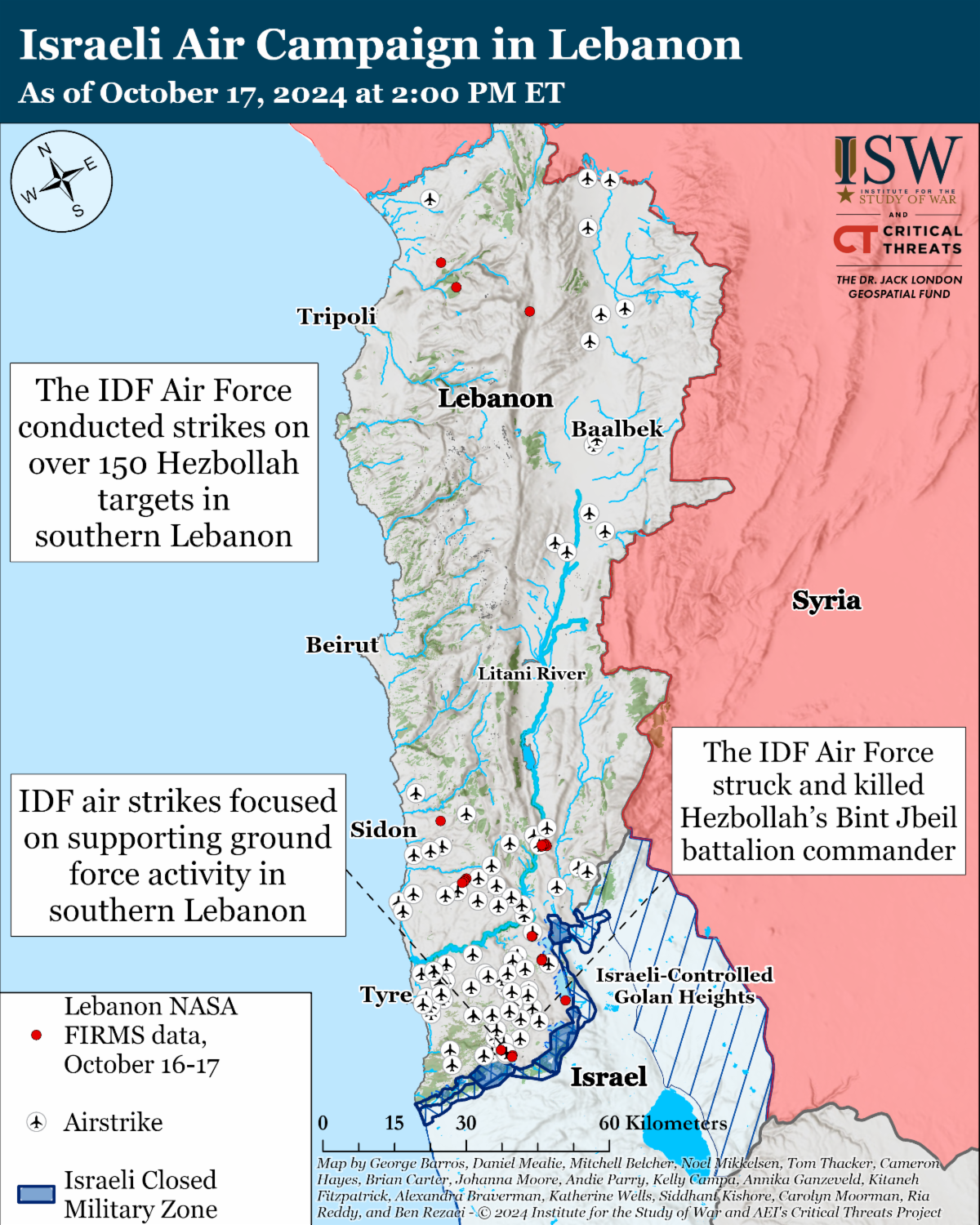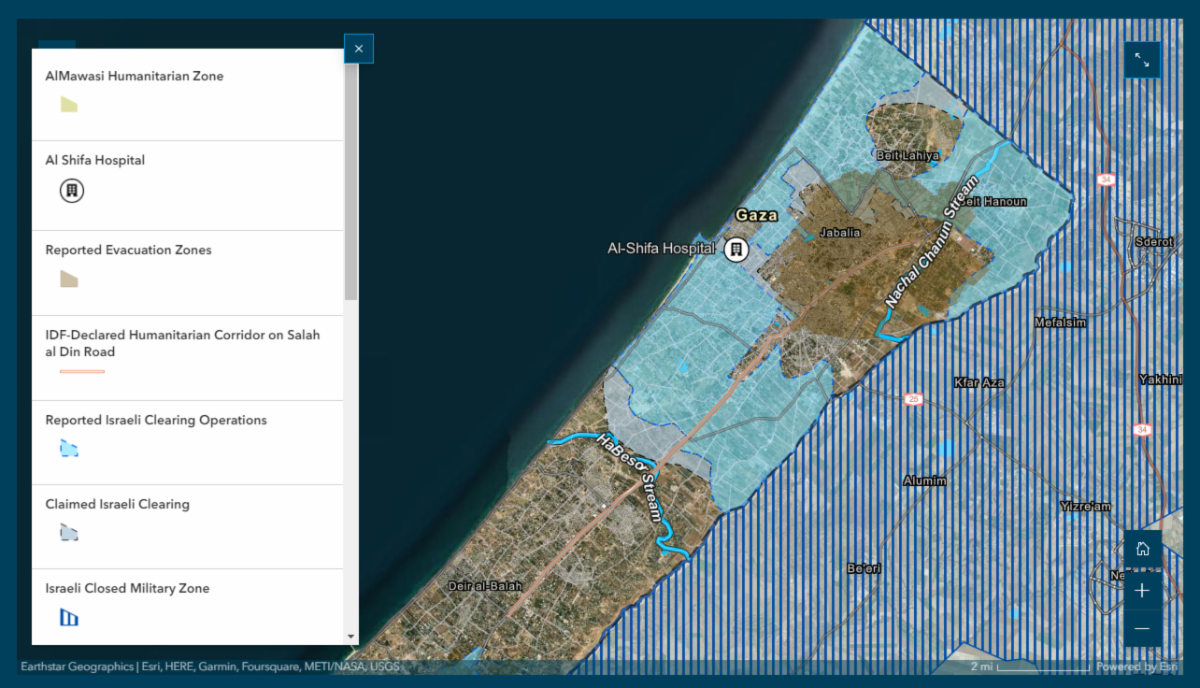Israel killed Hamas Political Bureau Chairman Yahya Sinwar in Rafah, southern Gaza Strip on October 16. Sinwar’s death is unlikely to change Hamas’ maximalist negotiating position meaningfully. Israeli officials confirmed on October 17 that the IDF 828th Infantry Brigade killed Sinwar in Tal al Sultan, Rafah Governorate. IDF soldiers located three fighters inside of a building, one of whom was later identified as Sinwar, and fired a tank round at the building. The IDF had previously assessed that Sinwar was likely using Israeli hostages in the Gaza Strip as a “human shield” after Israeli forces found Sinwar’s DNA samples in a tunnel where six hostages were killed on August 31. The IDF did not report the presence of Israeli hostages with Sinwar at the time of his death, however.
Sinwar’s death is unlikely to meaningfully change Hamas’ negotiating position because Hamas aims to exploit the hostages it still holds to compel Netanyahu to agree to a ceasefire that would enable Hamas to rebuild. Hamas executed six hostages who had been traveling with Sinwar in late August 2024 and publicized propaganda videos of the hostages. These videos were intended to trigger domestic Israeli pressure on Netanyahu in order to compel his government to agree to a ceasefire with Hamas. Khalil al Hayya, Sinwar’s deputy and chief negotiator, will probably take over Hamas’ political affairs in the interim period. Hayya—who, like Sinwar, is close to Iran—has shown little willingness to moderate his positions.
Mohammad Sinwar is the most likely replacement for Yahya Sinwar in the Gaza Strip, but he will likely split his military duties with other commanders. Hamas is unlikely to immediately publicly appoint a new political chief in the Gaza Strip, given the reality that Hamas' political organization is under extreme pressure in the Strip right now. Mohammad Sinwar’s military control of the group would at least in theory give him control over the hostages, though given the severely degraded state of Hamas’ command and control, it is far from clear that any single Hamas commander could be aware of the locations of hostages. Other commanders, like Gaza City Brigade Commander Izz al Din al Haddad, will also probably assume some of Yahya’s and former Hamas military wing commander Mohammad Deif’s responsibilities if they have not done so already. Mohammad Sinwar also has the requisite experience as a military commander that would enable him to rebuild Hamas, however, if allowed to do so. Mohammad Sinwar has served in many capacities for Hamas’ military wing, including as logistics and manpower chief and a brigade commander. He was also part of Yahya’s inner circle as a war planner and strategist. These skills will be extremely sought-after by Hamas’ leadership if it emerges from this war able to rebuild in the Gaza Strip.
The death of Yahya Sinwar and the transition to new commander(s) will have minimal impact on Hamas’ command and control structure, however. Israeli ground and air operations in the Gaza Strip have defeated or severely degraded Hamas units across the Gaza Strip. This reality means that Mohammad Sinwar and others, like Izz al Din al Haddad, will be unable to immediately influence dynamics on the ground. Hamas fighters are currently fighting in small cells. The value of Mohammad Sinwar and Izz al Din al Haddad will come if they manage to survive this war and if the end of this war enables Hamas to reinvest in its military wing in the Gaza Strip to rebuild. Their military experience under those conditions would be invaluable to rebuilding Hamas.
Key Takeaways:
- Gaza Strip: Israel killed Hamas Political Bureau Chairman Yahya Sinwar in Rafah, southern Gaza Strip on October 16. Sinwar’s death is unlikely to change Hamas’ maximalist negotiating position meaningfully.
- Sinwar’s Succession: Mohammad Sinwar is the most likely replacement for Yahya Sinwar in the Gaza Strip, but he will likely split his military duties with other commanders. Hamas is unlikely to immediately publicly appoint a new political chief in the Gaza Strip, given the reality that Hamas' political organization is under extreme pressure in the Gaza Strip right now. The death of Yahya Sinwar and the transition to new commander(s) will have minimal impact on Hamas’ command and control structure, however, given the degraded state of Hamas’ military organization.
- Iranian Diplomatic Efforts: Iranian Foreign Affairs Minister Abbas Araghchi traveled to Egypt on October 16, marking the first time an Iranian official has visited Egypt since 2014. Araghchi’s visit is likely part of ongoing Iranian-backed efforts to reach a ceasefire in the Gaza Strip and Lebanon.
- Yemen: The United States Central Command (CENTCOM) conducted multiple precision airstrikes using B2 Spirit stealth bombers in unspecified locations in Houthi-controlled Yemen on October 16. The strikes targeted Houthi underground weapons storage facilities that contained “various advanced conventional weapons.”
- Israeli Ground Operations in Lebanon: Israeli media reported on October 17 that Hezbollah fighters killed five 1st Infantry Brigade soldiers during clearing operations in southeastern Lebanon on October 16.
| 






 [ISW] 이스라엘-하마스 전쟁(이란) 업데이트, 2024년 10월 28일
[ISW] 이스라엘-하마스 전쟁(이란) 업데이트, 2024년 10월 28일
 [ISW] 이스라엘-하마스 전쟁(이란) 업데이트, 2024년 9월 29일
[ISW] 이스라엘-하마스 전쟁(이란) 업데이트, 2024년 9월 29일